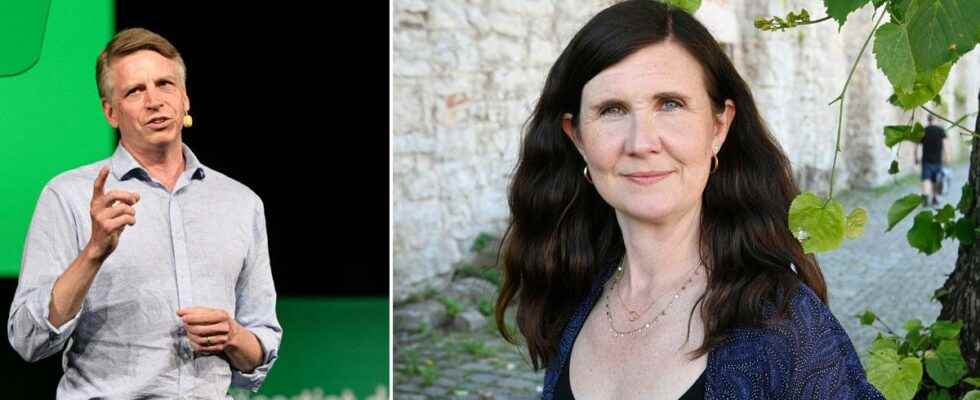Published: Just now
ALMEDALEN. For the first time in more than a year, the Green Party has overcome the parliamentary barrier, shows the latest voter barometer from Aftonbladet / Demoskop.
This means that both crisis parties, L and MP, are suddenly in the match again.
– I think that during this half year it has become clear that without the Green Party there will not be much climate and environmental policy, says the party’s spokesperson Märta Stenevi.
The Green Party has not been over the parliamentary barrier since May 2021 – but now the winds have turned.
In the latest survey from Aftonbladet / Demoskop, the party has received 4.9 percent, which is an increase of a full percentage point since last month. The figure is the highest since January 2021.
– It is a very positive message before the election campaign, and also gratifying to see that voters pay attention to the importance of environmental and climate work, says the party’s spokesperson Märta Stenevi.
Climate important voter issue
The voters come mainly from the Social Democrats and the Left Party, and many of them write in the survey that the climate is their most important election issue.
Demoscopes also measure which are the most common topics of conversation, and in recent months the climate crisis has been high on the list.
– It can both be due to the UN meeting in Stockholm, but it has also been a heat record in Europe. The discussion that climate change is coming faster than expected, says Karin Nelsson, CEO of Demoskop.
But there are also many who state that they plan to vote in favor of the Green Party.
– It may be a sign that the election movement is approaching. Social Democratic voters want to secure power by giving support to the Green Party, says Nelsson.
Stenevi wants order
Stenevi believes that they were low because issues other than the climate have dominated the media and topics of conversation.
– It can be said that the spring has been marked by another debate, the war in Ukraine and Sweden’s membership application to NATO, among other things. But I think that before the election, people think that this is an important issue.
The Green Party has since last summer said that they want a “June agreement” between S, MP, C and V that can form a strong stability in Sweden’s parliament.
– What we have seen in the last six months, where different constellations and parties control which issues are to be pursued by the government from week to week – so you can not have it, it just becomes chaos.
“A nail biter”
The survey also shows that the three largest parties S, M and SD are declining in voter support.
– There is a lot of movement now, and I interpret it as the election is approaching. We will probably see a lot of movement until September, says Karin Nelsson, CEO of Demoskop
At the same time, the small parties are moving forward. In addition to the Green Party, the Liberals are also reaping success, which stands at 4.7 percent.
– This is a real message of strength for the Green Party and the Liberals. Not only is it increasing now but they have been increasing for a couple of months now. It will be a nail-biter, this, says Karin Nelsson.
Märta Stenevi is not worried that the Green Party would have to pack its bags and leave the Riksdag after 18 September.
– I am one hundred percent sure that we will come in, but we can not rest on any laurels. Now it’s full island that applies until election day, and really hold on.
The parties’ support in percent in July and June, respectively, change in percentage points.
Facts
About the survey
Target group: The voting public, 18 years and older.
Question: “Which party would you vote for if there were parliamentary elections today?” If the respondent does not state party, they are asked the following question: “Which party is it leaning towards?” and those who do not answer this either get the follow-up question “Which party do you think is the least bad?”. In the report, these three questions are combined to show the result of the party’s sympathies if there were an election to the Riksdag today.
Investigation period: 22-30 June 2022.
Method and selection: The survey was conducted within the framework of the Initiative Panel, which reflects the Swedish people
Number of interviews conducted: The survey includes 2,125 interviews
Weighing: The sample is pre-stratified and weighted by age, gender, region and party in the previous election.
Read moreJoin our opinion panel
Do you want to participate and respond to Demoskop’s surveys where we find out what the Swedish people think about, for example, social issues and politics? Results are presented in Aftonbladet, among other places. It is voluntary to answer, you are anonymous and can leave whenever you want. Click on the link to register.
